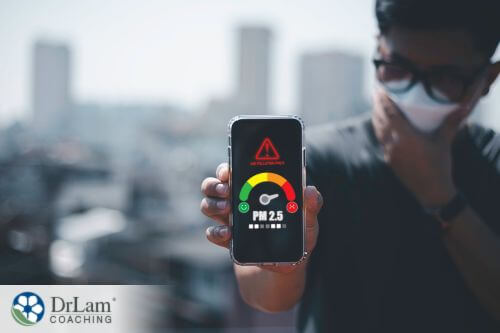 The air quality of your state, city, or country has a major effect on your health and safety. Reports on air quality often base their findings on particle or ozone air pollution to determine air quality status. You want to breathe in clean air where you reside, and so it’s important to know if the air is polluted. The "State of the Air" 2023 annual report highlights two of the most general and dangerous air pollutants, fine particles and ozone. It finds that after decades of progress in cleaning up sources of air pollution, roughly 36% of Americans continue to live in regions with failing grades for unhealthy levels of ozone or particle pollution. Climate change continues to pose a challenge in keeping the air clean. However, policies under the Clean Air Act are helping to drive positive change around the air quality where you live.
The air quality of your state, city, or country has a major effect on your health and safety. Reports on air quality often base their findings on particle or ozone air pollution to determine air quality status. You want to breathe in clean air where you reside, and so it’s important to know if the air is polluted. The "State of the Air" 2023 annual report highlights two of the most general and dangerous air pollutants, fine particles and ozone. It finds that after decades of progress in cleaning up sources of air pollution, roughly 36% of Americans continue to live in regions with failing grades for unhealthy levels of ozone or particle pollution. Climate change continues to pose a challenge in keeping the air clean. However, policies under the Clean Air Act are helping to drive positive change around the air quality where you live.
According to the "State of the Air" 2023 annual report, the lists of the cleanest cities for ozone and short-term particle pollution are not ranked because all the cities earned the same scores.
The first ten cities that are the cleanest based on ozone pollution listed include:
The first ten cities that are the cleanest based on short-term particle pollution include:
The top 5 cleanest cities on the list "Top 25 Cleanest U.S. Cities by Year-Round Particle Pollution" include:
The bottom 5 cleanest cities include:
Additionally, 59 cities had 0 high short-term particle days and 80 cities had zero ozone days. Of those cities, 7 ranks on all three of the cleanest cities lists. These include:
Looking at the most polluted cities by ozone, the top 5 are identified as:
The top 5 most polluted cities by year-round particle pollution listed in the report are:
Furthermore, the top 5 most polluted cities by short-term particle pollution highlighted are:
From a glance, California appears to have a big problem with the air quality, if it’s your home state. Bakersfield, California has the worst short-term particle pollution and continues to be the most polluted for year-round particle pollution. However, according to the report, it shares the latter ranking with Visalia, California. Also, Los Angeles, California continues to hold the top spot as the city with the worst ozone pollution in America.
 You can find out about what the air quality where you live is like each day by checking the Air Quality Index (AQI) for your area. According to the Centers for Disease Control and Prevention (CDC), the AQI indicates when high levels of air pollution are predicted for the day.
You can find out about what the air quality where you live is like each day by checking the Air Quality Index (AQI) for your area. According to the Centers for Disease Control and Prevention (CDC), the AQI indicates when high levels of air pollution are predicted for the day.
Readings or ranges for air quality can be:
You can check the AQI by doing one of two things: look up the AQI online, or sign up to get email or text AQI alerts. That way, you can arm yourself with the necessary information to plan your day’s activities and remain safe and healthy.
When faced with unhealthy air quality that leads to the issuance of an Air Quality alert for your area, you may wonder if you should run your AC unit. Maybe you’re faced with a high concentration of smoke from a wildfire, for instance.
You can run your AC when air quality is bad, but only if it's recirculating inside air, which means that it's not drawing in air from the outside.
When the air is bad, ACs that pull air from outside can bring fine particulate matter, or tiny airborne particles, into your home. If you have a window AC unit that pulls in air from the outdoors into your home, it doesn’t usually have a strong filtration system. Drawing in bad air from the outdoors can lead to negative health effects.
However, centralized AC and AC units attached to walls do not typically pull in air from the outdoors. Also, they filter well what few particles might make their way inside. However, make sure your AC filter is up to date when operating the AC in poor air quality.
According to an article in Scientific Reports, air pollution is the fourth greatest overall risk factor for human health problems. Exposure to air pollution can result from pollen, vehicle exhaust, road dust, smoke, industrial emissions, gas-fueled yard equipment, and chemicals in household cleaners, among other sources.
Polluted air can negatively impact your health. Air pollutants can enter your bloodstream and contribute to a range of health issues, from itchy eyes to premature death. A person’s health risks from air pollution vary greatly depending on age, location, and underlying health.
This type of pollution of air quality where you live can cause several health issues including:
It can also worsen conditions like cardiovascular and heart disease, asthma, and chronic obstructive pulmonary disease (COPD).
This type of pollution can cause several health issues including:
Furthermore, ozone pollution can worsen conditions like asthma, COPD, and emphysema.
Certain groups of people are more prone to health issues resulting from exposure to polluted air. These include people:
 If the air quality where you live is bad, you can have either short-term or long-term effects depending on the duration of exposure to pollutants.
If the air quality where you live is bad, you can have either short-term or long-term effects depending on the duration of exposure to pollutants.
Short-term exposure to fine particles can affect your health by aggravating lung disease, triggering asthma attacks and acute bronchitis, and possibly increasing the risk of respiratory infections. Heart attacks, abnormal heartbeats, chest tightness, eye burning or irritation, light coughing, fatigue, and headaches are also linked to short-term exposure.
Long-term exposure to fine particles can increase the risk of developing COPD, chronic bronchitis, cardiovascular disease, or lung cancer. Particularly if the source of the pollution is wood smoke, in high concentration, it can permanently damage your lung tissue.
Over time, long-term exposure to polluted air could potentially lead to fatigue in the adrenal glands. This is Adrenal Fatigue Syndrome (AFS), the non-Addison's form of adrenal dysfunction, where the body's stress response cannot keep up with life's chronic stressors. Prolonged pollution exposure can cause chronic stress and lead to issues with your body‘s stress response.
Chronic stress keeps cortisol, the stress hormone, high. This tends to result in the NeuroEndoMetabolic (NEM) stress response and the adrenal glands being overworked. When this happens, a dysfunction of the NEM stress response circuits occurs.
Subsequently, it impacts the Detoxification circuit, which is comprised of the interstitium, immune system, and liver. Poor detoxification can cause toxins to build up in the body, creating health problems and worsening stress.
There are certain steps that you can take to protect your health and stay safe if air quality and the air quality where you live are unhealthy. You can:
When it comes to the air quality where you live, it's important to stay informed so you can breathe in fresh and safe air. Healthy air is essential to avoid long-term problems like COPD or lung cancer. Taking steps like staying informed of poor air quality, knowing what kind of air conditioning system you have, and avoiding activities near high-pollution areas can help.
If you would like to learn about natural ways to support your detox system, the team at Dr. Lam Coaching can help. We offer a free** no-obligation phone consultation at +1 (626) 571-1234 where we will privately discuss your health concerns and various options. You can also send us a question through our Ask The Doctor system by clicking here.
Air Quality: How do I get information about air quality where I live? (2019)Centers for Disease Control and Prevention. Accessed from https://www.cdc.gov/air/infographics/information-about-local-air-quality.htm
Juginović, Alen et al. “Health impacts of air pollution exposure from 1990 to 2019 in 43 European countries.” Scientific reports vol. 11,1 22516. 18 Nov. 2021, doi:10.1038/s41598-021-01802-5 https://pubmed.ncbi.nlm.nih.gov/34795349/
State of Air: Report of Cards. (2023). American Lung Association. Accessed from https://www.lung.org/research/sota/city-rankings/most-polluted-cities
You can learn about the state of air quality where you live by signing up to get alerts online and checking the Air Quality Index (AQI) for your area. The State of the Air 2023 annual report can also provide you with rating information on the air quality in your city and state.
